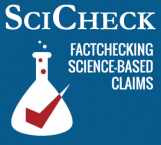SciCheck Digest
The World Health Organization began using the term “Disease X” in a 2018 planning document to refer to a “currently unknown” illness. But since the term was used at the January meeting of the World Economic Forum, conspiracy theorists baselessly claim Disease X is part of a “Globalist Plan to … Install World Government.”
Full Story
Disease X is the term the World Health Organization uses as a placeholder to represent an as-yet unknown new illness.

That’s like the term X factor, meaning an essential quality that is hard to define, or the use of X in mathematics, where the letter represents an unknown variable.
But online, conspiracy theorists and misinformation peddlers have twisted the term Disease X into something that is supposedly part of a sinister plot to wreak havoc on the world.
For example, Alex Jones, the conspiracy theorist behind InfoWars, claimed in a post on X, the platform formerly known as Twitter, that there is a “Globalist Plan to Launch #DiseaseX to Install World Government.”
And Donald Trump Jr. referred to a Jan. 17 panel held at the World Economic Forum in Davos, Switzerland, when he wrote on Instagram, “I don’t trust the WEF clowns as far as I could throw them… They’re already talking about Disease X. Be prepared for whatever they throw you by checking out The Wellness Company, one of my triggered podcast’s newest sponsors!!!!”
Trump’s post asks “Why are they preparing for a hypothetical disease?” and encourages followers to purchase the Wellness Company’s “emergency medical kit.” The kit includes ivermectin and sells for $299.99 from his podcast sponsor, which we’ve written about before.
But posts that suggest or claim Disease X will be intentionally released in pursuit of world domination are unfounded.
As we said, the term is a placeholder that public health officials use to refer to potential future diseases, and the WEF panel Trump Jr. mentioned was focused on how governments and health systems can prepare for the next pandemic.
During the panel discussion in Davos earlier this month, WHO Director-General Dr. Tedros Adhanom Ghebreyesus acknowledged the misinformation circulating on social media about Disease X. He explained, “we annually list the emerging diseases and MERS could be one, Zika, Ebola — those we know — but then we said, there are things that are unknown, that may happen and anything happening is a matter of when, not if, so we need to have a placeholder for that, for the diseases we don’t know that may come. And that was when we gave the name, ‘Disease X.’ So, ‘Disease X’ is a placeholder for unknown diseases.”
The WHO began using the term in 2018, Tedros said.
The organization’s February 2018 “annual review of diseases prioritized under the Research and Development Blueprint” listed eight types of priority diseases. The list included “Disease X,” which the document described as representing “the knowledge that a serious international epidemic could be caused by a pathogen currently unknown to cause human disease, and so the R&D Blueprint explicitly seeks to enable cross-cutting R&D preparedness that is also relevant for an unknown ‘Disease X’ as far as possible.”
So the term is nothing new. It has been used for six years.
Tedros acknowledged that discussing the possible emergence of a deadly, new pathogen “may create panic.” But, he said, “It’s better actually to anticipate something that may happen — because it has happened in our history many times — and prepare for it. We shouldn’t face things unprepared. We can prepare for some unknown things as well. Because there are basic things you can do.”
During the panel discussion, some of the suggestions for ways to prepare for the next Disease X were smoothing supply chains for vaccines, treatments and medical equipment; reinforcing epidemiological centers so there is better surveillance; and building health care systems that can expand when the need arises.
“Whatever the disease is, you should prepare for it,” Tedros said. “You don’t need to know the disease — there are common factors.”
Editor’s note: FactCheck.org is one of several organizations working with Meta to debunk misinformation shared on social media. Our previous stories can be found here. Meta has no control over our editorial content.
Sources
Schumer, Peter. “X marks the unknown in algebra – but X’s origins are a math mystery.” The Conversation. 2 Aug 2023.
Yandell, Kate. “Posts Push Unproven ‘Spike Protein Detoxification’ Regimen.” FactCheck.org. 21 Sep 2023.
World Economic Forum. “Preparing for Disease X.” 17 Jan 2024.
World Health Organization. “2018 Annual review of diseases prioritized under the Research and Development Blueprint.” 7 Feb 2018.